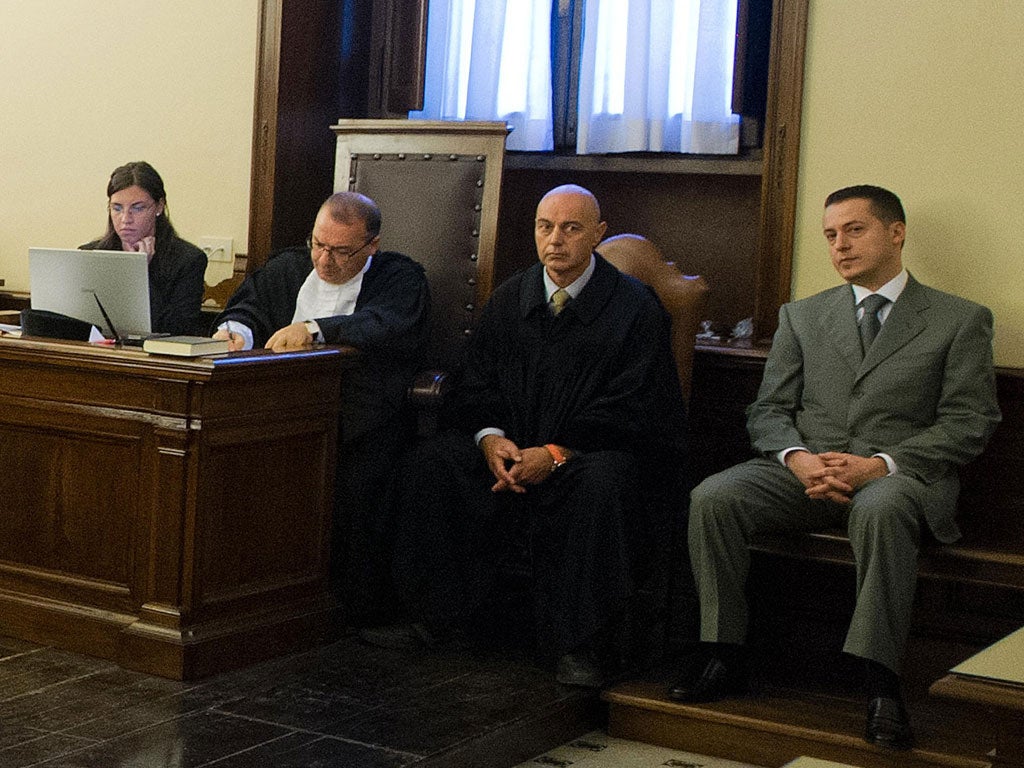Your support helps us to tell the story
From reproductive rights to climate change to Big Tech, The Independent is on the ground when the story is developing. Whether it's investigating the financials of Elon Musk's pro-Trump PAC or producing our latest documentary, 'The A Word', which shines a light on the American women fighting for reproductive rights, we know how important it is to parse out the facts from the messaging.
At such a critical moment in US history, we need reporters on the ground. Your donation allows us to keep sending journalists to speak to both sides of the story.
The Independent is trusted by Americans across the entire political spectrum. And unlike many other quality news outlets, we choose not to lock Americans out of our reporting and analysis with paywalls. We believe quality journalism should be available to everyone, paid for by those who can afford it.
Your support makes all the difference.Pope Benedict's former butler went on trial yesterday for using his intimate access to the Pope's desk to steal and leak explosive documents in what he said was an attempt to clean up corruption in the Vatican.
By day, Paolo Gabriele was a deferential member of the Vatican's innermost circle, helping Pope Benedict to dress, serving him his meals, and possessing a key held by fewer than 10 people to a lift leading from a small courtyard directly into the Pope's apartments. But by night, the court heard, he was obsessed with helping to root out what he saw as corruption in the Catholic Church.
On the first day of the hearing, the 46-year-old suffered a blow when judges refused to admit evidence from the church's own investigation into the case. His lawyer Cristiana Arru had wanted the transcripts of that inquiry, in which cardinals questioned Vatican employees, to be included to try to show her client's motives. The chief judge, Giuseppe Dalla Torre, said it had "no relevance" to the Vatican City's penal code.
Police seized 82 boxes of documents from Mr Gabriele's apartments inside the Vatican and in the papal summer residence over the summer, the court was told during what was a largely procedural opening session.
This is the most high-profile case to come before the three-judge panel since the creation of the Vatican City state in 1929. Mr Gabriele is accused of taking the Pope's correspondences, photocopying the documents and handing them to Italian journalist Gianluigi Nuzzi, whose book His Holiness: The Secret Papers of Pope Benedict XVI, was published in May.
The most notorious of the letters were written to the Pope by Archbishop Carlo Maria Vigano, currently the Vatican's ambassador to Washington, who was deputy governor of the Vatican at the time. In one, the archbishop complains that when he took office in 2009, he discovered corruption, nepotism and cronyism linked to the awarding of contracts at inflated prices. He later wrote to the Pope about a smear campaign against him by other Vatican officials who were upset that he had taken drastic steps to clean up the purchasing procedures. Mr Nuzzi has said his source, codenamed "Maria" in the book, wanted to shed light on the secrets of the church.
Taken as a whole, the documents seem aimed primarily at discrediting Cardinal Tarcisio Bertone, the Vatican secretary of state and Benedict's long-time deputy. Cardinal Bertone, 77, a canon lawyer and football enthusiast, has been criticised for perceived shortcomings in running the Vatican.
Only eight journalists were allowed into the court, a small, wood-panelled room with a papal emblem on its ceiling. No oaths are taken at the start of the trial, as the Vatican legal system, like the Italian one on which it is based, assumes that a suspect may lie for self-protection.
Mr Gabriele, who said he saw himself as an "agent of the Holy Spirit", is widely expected to be found guilty because he has confessed. To fathom the apparent gulf between Mr Gabriele's acts and his appearance as a reserved and obedient servant of the Pope, the Vatican summoned psychologists to determine if he could be held responsible for his actions. The results were conflicting. One report cited in the indictment concluded that Mr Gabriele showed no signs of major psychological disorder or of being dangerous. Another concluded that he was socially dangerous, easily influenced and could "commit acts that could endanger himself or others".
The arrest of Mr Gabriele, a father of three who began his Vatican career as a cleaner and who has since lived a simple but comfortable life in the city-state, capped nearly five months of intrigue and suspense after a string of documents and private letters found their way into the Italian media. Since the papal state has no prison, Mr Gabriele would serve time in an Italian jail, though the Pope is widely expected to pardon him.
Yesterday, the court separated the trial of Mr Gabriele and his co-defendant, a Vatican IT expert. The hearing resumes on Tuesday, when Mr Gabriele will be questioned.

Join our commenting forum
Join thought-provoking conversations, follow other Independent readers and see their replies
Comments